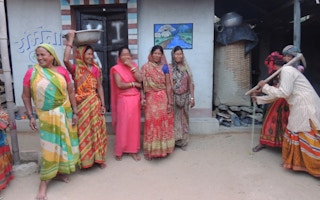However, studies on how to promote more equal gender relations among smallholder farmers and water resource user groups at the local level are rare. For change to happen, everyday development and research practice must shift towards more inclusive and gender-equal community engagements.
A journal article entitled ‘Transformative Engagements with Gender Relations in Agriculture and Water Governance,’ written by Stephanie Leder, Gitta Shrestha and Dipika Das, explores opportunities to promote empathy and critical consciousness related to gender norms, roles and relations in agriculture and water resource management.
The article is part of a special issue - ‘Water Security and Inclusive Water Governance in the Himalayas‘ - published by the journal ‘New Angle - the Nepal Journal of Social Science and Public Policy.’
“
Women still face severe inequalities in access to and control over agricultural production and natural resources and are often left out of decision-making processes.
Considering this, researchers at the International Water Management Institute (IWMI), supported by WLE, developed a participatory gender training (Leder et al, 2016) for female and male farmers involved in community and development projects.
The training builds on theoretical and empirically grounded approaches, and uses open dialogue to promote participatory community engagement. The supporting research and training methods used are discussed in the new paper.
The training methods combined the principles of ‘critical pedagogy’ (Freire, 1996) and ‘transformative practice’ (Leder, 2018) - offering participants a safe space for discussion and reflection on gender perceptions within their own cultural contexts, without the imposition of ‘western’ views on gender relations. First implemented across six villages in Nepal and India, the training consisted of groups of 12 farmers. The training was tested with four female-only groups, one male-only group and seven mixed-gender groups.
Gender, empathy and bargaining
A key highlight of the training is the promotion of empathy, and the principle of ‘bargaining.’ Bargaining can be defined as an act of negotiation through the use of power to achieve an outcome (Martin, 1992).
Women smallholders, however, often have low bargaining power because of gender norms and structural disadvantages such as lower literacy levels.
In agriculture, this could limit women’s ability to negotiate favourable market prices or make self-determined choices related to farm income or produce.
To demonstrate how gender norms influence bargaining, the training uses a role-play activity which switched genders. The farmers played the role of the other gender in a specific scene, for example to discuss women’s burden of daily household chores and agricultural tasks, or landlord-tenant negotiations.

Gender position bar: reflecting on the gendered division of labour in Saptari, Nepal. Image: Stephanie Leder/IWMI.
This role-play activity promotes creativity and at the same time examines how women and men perceive the other gender, with the aim of generating empathy towards those with weaker bargaining power. The farmers also discuss in two picture-based activities how gender relations influence the everyday life of women and men.
These exercises are important because they allow both men and women to bargain around the gender-related constraints they face. And for women, the group activity may provide a way to speak about issues they may not be able to in other settings (to watch a 12 minute documentary on the gender training activities, click here)
Getting the facilitation right
Gender trainings are highly sensitive, and untrained facilitators might unconsciously reinforce existing inequalities. Usually, community mobilizers are the project personnel that farmers have interacted with before. Community mobilizers oversee aspects of project implementation, form community groups and facilitate trainings, often without being trained on gender and social relations.
The Participatory Gender Training addresses this gap by providing community mobilizers a safe space to share and discuss their personal and professional experiences on gender and power relations.
The community mobilizers in the training acknowledged that they’d never previously had the opportunity to learn about gender concepts, its applications in their daily work or its influence on agricultural development. Importantly, the training helped them realise that women’s participation in projects was far more than nominal.
For some participants, the discussion helped them to reflect on their own social positions in relation to the farmers. Speaking about her experience, a female community mobilizer said “I did not know we also perform gendered practices. And that we also practice discrimination. I learnt the importance of self-reflection.”
Successfully implementing gender training requires expertise in facilitation skills. An accompanying training manual provides tips on how to make discussions inclusive, participatory and relevant to the specific local context.
It also provides guidance on group size, the composition of participations, training locations, making appropriate probes, using sensitive and comprehensible words and language, minimising power differences, acting neutral and discouraging conflicts.
Transforming gender relations - carefully and gradually
The training program and methods provide an environment for open discussion on local gender relations, and for rethinking gendered labour divisions within the household, in agriculture, and in natural resource management. But it is not a silver bullet for immediate change in highly complex, gendered communities.
Each training needs to be structured, contextualised and carefully facilitated to navigate sensitivities and encourage meaningful participation. Nevertheless, the outcome of the pilot trainings is promising and may help build a new way of rethinking gender relations in agriculture.
This story was originally published by Thrive Blog under a Creative Commons’ License and was republished with permission.

















